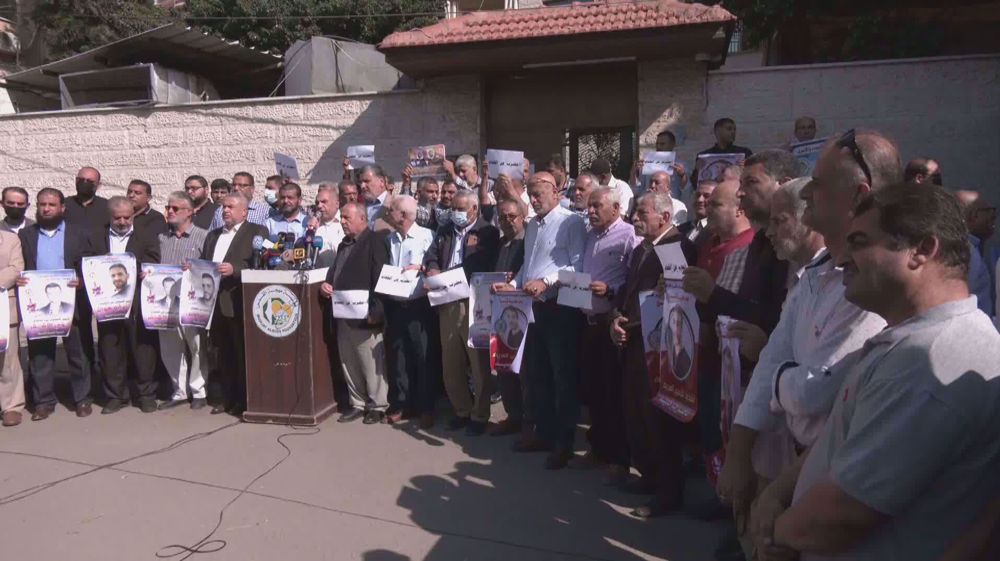Thousands of Palestinian prisoners reject meals in solidarity with 6 fellow hunger-striker inmates
Thousands of Palestinian prisoners have rejected meals in solidarity with six fellow inmates who have been on hunger strike for weeks to protest Israel’s illegal administrative detention policy, which allows prisoners to be held for long periods of time without charge or trial.
On Sunday, thousands of Palestinians behind bars in Israeli prisons decided to reject the lunch and dinner meals in solidarity with six fellow inmates who have been on hunger strike in protest against their indefinite detention, Palestine’s official Wafa news agency reported.
More than 4,500 Palestinian inmates have so far joined the one-day action.
According to the report, citing a statement by the Palestinian Authority (PA)’s Palestinian Commission of Detainees and Ex-Detainees Affairs, Kayed al-Fasfous has been on a hunger strike for 116 days, the longest strike among the six. The other prisoners are Miqdad Qawasmeh, who has been on hunger strike for 109 days, Alaa Aaraj (92 days), Hesham Abu Hawwash (82 days), Ayyad Hureimi (46 days) and Lo’ai al-Ashqar (28 days).
The health conditions of the hunger strikers are very critical, particularly Fasfous and Qawasmeh, who have been in hospital following serious deterioration in their health conditions, said Hassan Abed Rabbo, a spokesman for the commission.
The two inmates suffer from irregular heartbeats and serious decline in body fluids and vitamins, he added.
The commission further warned that Fasfous might die at any moment, adding that Qawasmeh also suffers serious health complications in his lungs, kidney, and liver.
The six Palestinian hunger strikers have been demanding an end of their administrative detention based on a “secret file,” which even their lawyers are not allowed to view.
The so-called secret files are provided by the Israeli intelligence service and is renewed successively.
On Thursday, Israel’s prosecution office informed the Palestinian Prisoners' Society (PPS) of its intent to extend the administrative detention of al-Qawasmeh, who has been in the Israeli administrative detention with no trial or indictment.
On October 21, experts of the United Nations expressed grave fear for the lives of the hunger strikers, calling on the occupying regime to either release or charge the prisoners. They also urged Tel Aviv to completely end its unlawful practice of administrative detention.
“In violation of international law, Israel continues to use administrative detention to imprison more than 500 Palestinians – including six children – without charges, without trials, without convictions, all based on classified secret information that the detainees have no access to,” the experts said in a statement.
“They have no recourse to challenging these undisclosed allegations, and they do not know when, or if, they are going to be released,” the statement further read.
More than 7,000 Palestinians are reportedly held in Israeli jails. Hundreds of them have apparently been incarcerated under the administrative detention, a policy under which Palestinian inmates are kept in Israeli detention centers without trial or charge.
Some Palestinian prisoners have been held in administrative detention for up to 11 years.
Palestinian inmates regularly stage hunger strike in protest at the administrative detention policy and harsh conditions in Israeli jails.
Over a dozen Palestinian lawmakers and nearly 20 journalists are also held in Israeli detention centers, several of them under the administrative detention policy.
In 2015, Israel approved a law that authorizes force-feeding the Palestinian prisoners on hunger strike, a practice rejected by the UN as a violation of human rights.

‘Complete humanitarian collapse’ imminent in Gaza: Media office

UN envoy urges journalists to speak out on Gaza genocide

Israel bombed Gaza with explosives equivalent to 6 Hiroshima bombs: Report
China says stands with Malaysia, region in face of unilateralism
UN envoy urges journalists to speak out on Gaza genocide
‘Complete humanitarian collapse’ imminent in Gaza: Media office
Doctors Without Borders: Israel has turned Gaza into ‘mass grave’
Iran, Tajikistan discuss defense partnership, counter-terrorism cooperation
VIDEO | Yemen expands pro-Gaza operations despite US air aggression
VIDEO | Palestinians mark Prisoners’ Day amid Israeli atrocities
Airbus plane grounded due to US sanctions returns to Iran’s fleet











 This makes it easy to access the Press TV website
This makes it easy to access the Press TV website